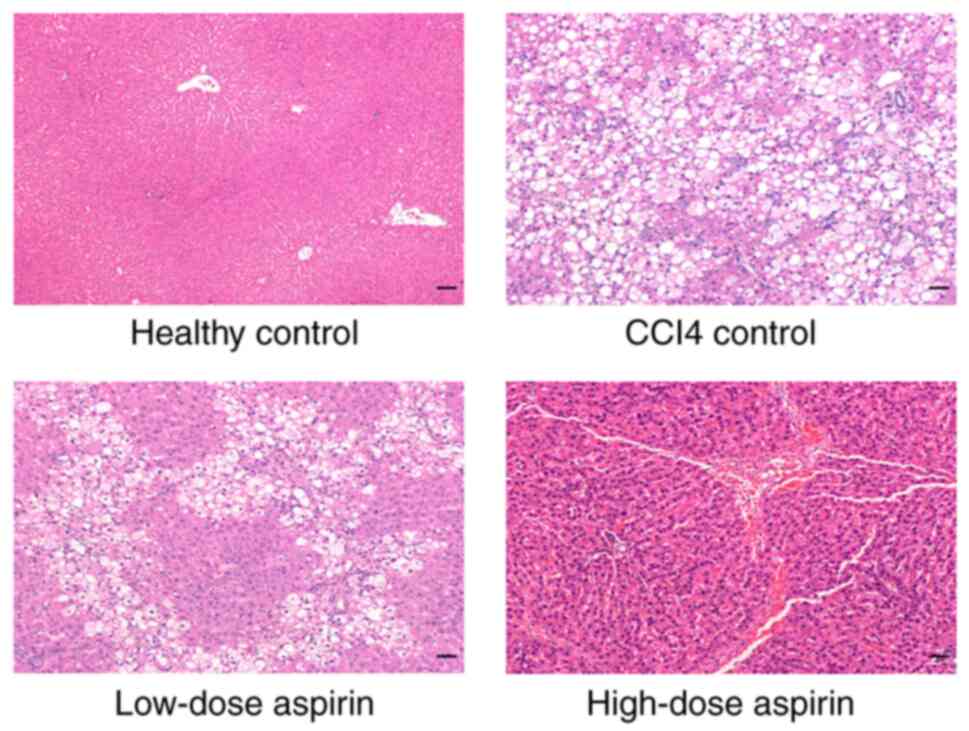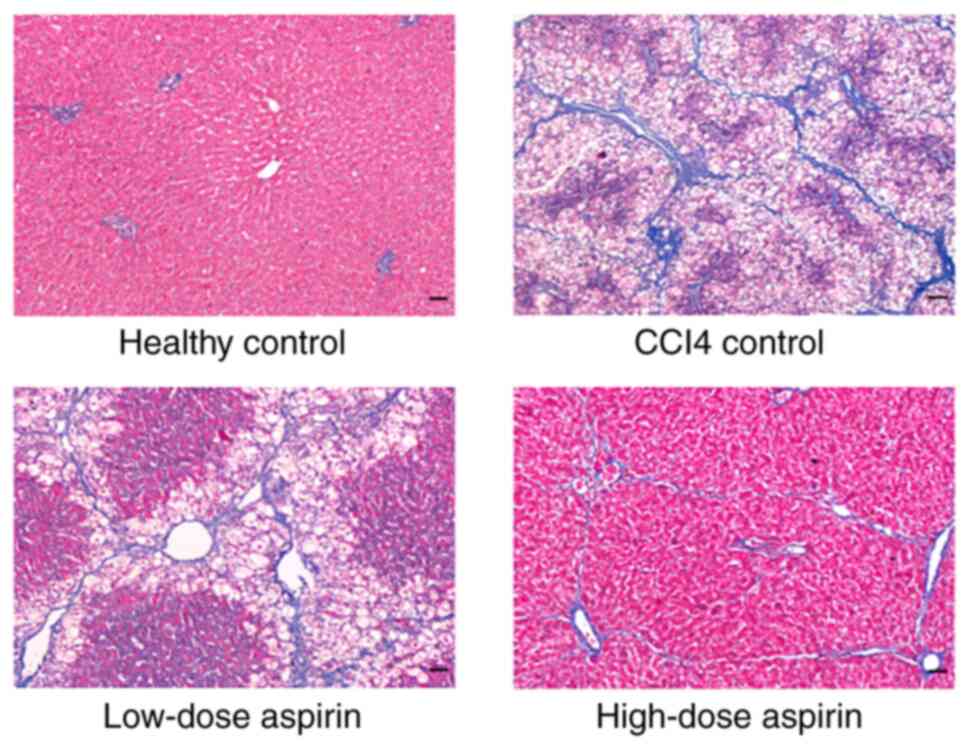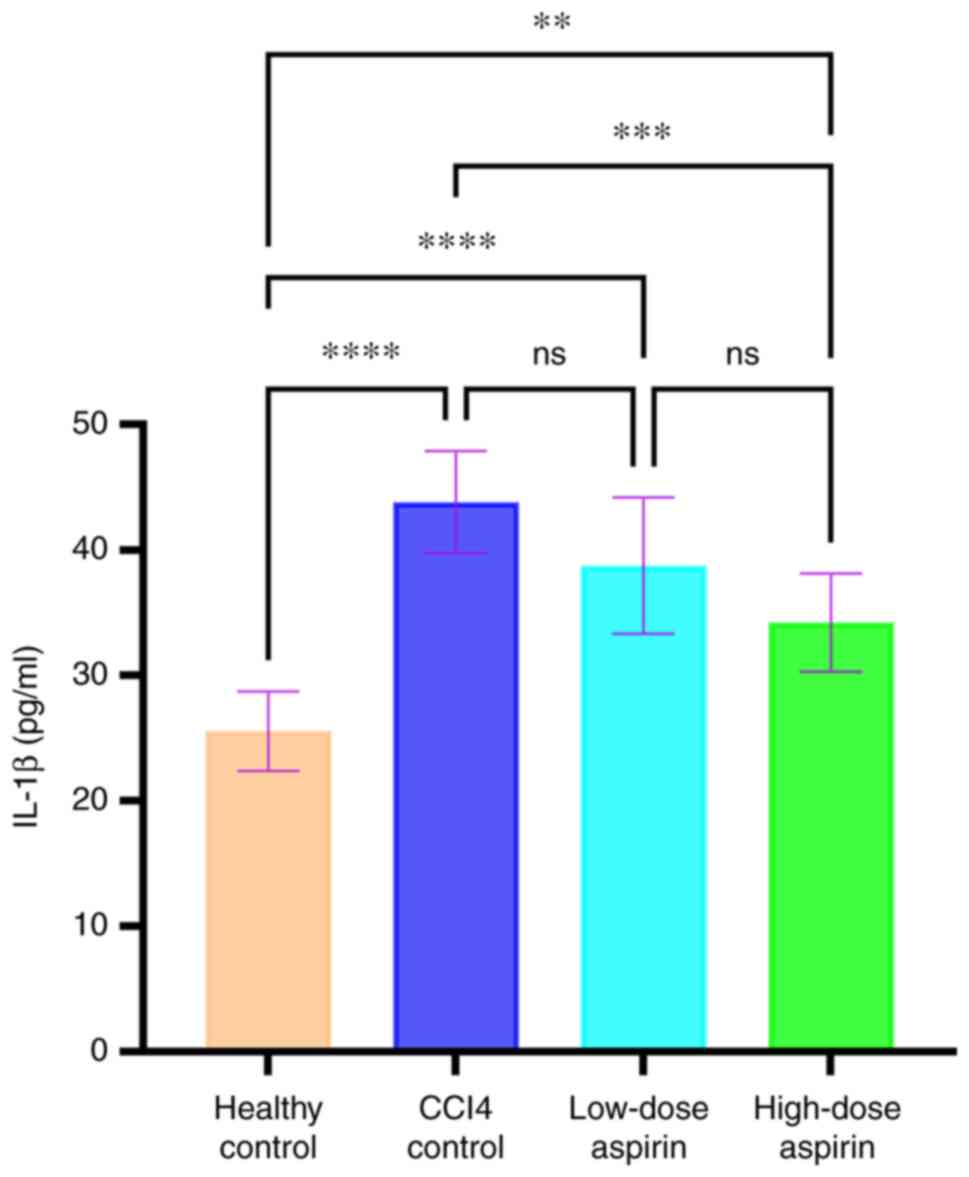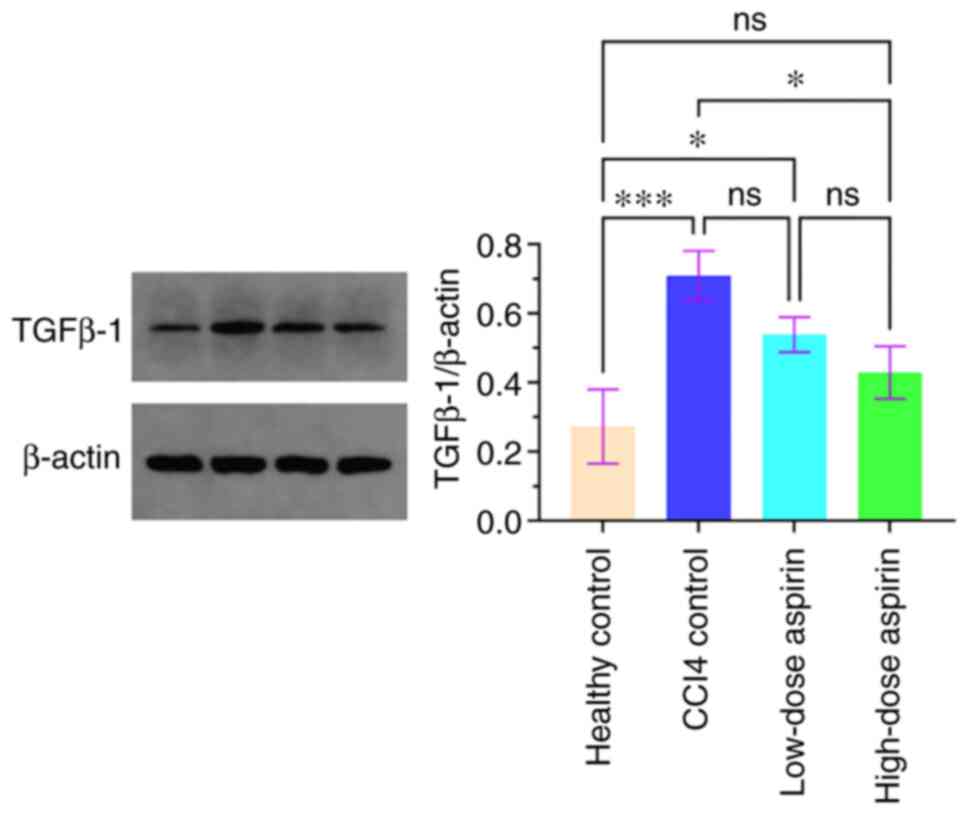|
1
|
Liu J, Liang W, Jing W and Liu M:
Countdown to 2030: Eliminating hepatitis B disease, China. Bull
World Health Organ. 97:230–238. 2019.PubMed/NCBI View Article : Google Scholar
|
|
2
|
Mormone E, George J and Nieto N: Molecular
pathogenesis of hepatic fibrosis and current therapeutic
approaches. Chem Biol Interact. 193:225–231. 2011.PubMed/NCBI View Article : Google Scholar
|
|
3
|
Czaja AJ: Review article: The prevention
and reversal of hepatic fibrosis in autoimmune hepatitis. Aliment
Pharmacol Ther. 39:385–406. 2014.PubMed/NCBI View Article : Google Scholar
|
|
4
|
Iredale J: Defining therapeutic targets
for liver fibrosis: Exploiting the biology of inflammation and
repair. Pharmacol Res. 58:129–136. 2008.PubMed/NCBI View Article : Google Scholar
|
|
5
|
Lee NY and Suk KT: The role of the gut
microbiome in liver cirrhosis treatment. Int J Mol Sci.
22(199)2020.PubMed/NCBI View Article : Google Scholar
|
|
6
|
Sun Y, Liu B, Xie J, Jiang X, Xiao B, Hu X
and Xiang J: Aspirin attenuates liver fibrosis by suppressing
TGF-β1/Smad signaling. Mol Med Rep. 25(181)2022.PubMed/NCBI View Article : Google Scholar
|
|
7
|
Zhu H, Zhao H, Xu S, Zhang Y, Ding Y, Li
J, Huang C and Ma T: Sennoside A alleviates inflammatory responses
by inhibiting the hypermethylation of SOCS1 in
CCl4-induced liver fibrosis. Pharmacol Res.
174(105926)2021.PubMed/NCBI View Article : Google Scholar
|
|
8
|
Fagone P, Mangano K, Pesce A, Portale TR,
Puleo S and Nicoletti F: Emerging therapeutic targets for the
treatment of hepatic fibrosis. Drug Discov Today. 21:369–375.
2016.PubMed/NCBI View Article : Google Scholar
|
|
9
|
Adrian JE, Poelstra K, Scherphof GL,
Meijer DK, van Loenen-Weemaes AM, Reker-Smit C, Morselt HW, Zwiers
P and Kamps JA: Effects of a new bioactive lipid-based drug carrier
on cultured hepatic stellate cells and liver fibrosis in bile
duct-ligated rats. J Pharmacol Exp Ther. 321:536–543.
2007.PubMed/NCBI View Article : Google Scholar
|
|
10
|
Prud'homme GJ: Pathobiology of
transforming growth factor beta in cancer, fibrosis and immunologic
disease, and therapeutic considerations. Lab Invest. 87:1077–1091.
2007.PubMed/NCBI View Article : Google Scholar
|
|
11
|
Song M, Song Z, Barve S, Zhang J, Chen T,
Liu M, Arteel GE, Brewer GJ and McClain CJ: Tetrathiomolybdate
protects against bile duct ligation-induced cholestatic liver
injury and fibrosis. J Pharmacol Exp Ther. 325:409–416.
2008.PubMed/NCBI View Article : Google Scholar
|
|
12
|
Tao Z, Yuan Y, Gu JY, Shi DW, Yao CJ, Tong
CY, Shen H, Xue MM, Song Z and Cai YY: Inhibitory effect and
mechanism of aspirinin in the treatment of bleomycin-induced
pulmonary fibrosis in rats. Fudan Univ J Med Sci. 40:395–399.
2013.
|
|
13
|
Guilherme RF, Xisto DG, Kunkel SL,
Freire-de-Lima CG, Rocco PR, Neves JS, Fierro IM, Canetti C and
Benjamim CF: Pulmonary antifibrotic mechanisms aspirin-triggered
lipoxin A(4) synthetic analog. Am J Respir Cell Mol Biol.
49:1029–1037. 2013.PubMed/NCBI View Article : Google Scholar
|
|
14
|
Jiang ZG, Feldbrügge L, Tapper EB, Popov
Y, Ghaziani T, Afdhal N, Robson SC and Mukamal KJ: Aspirin use is
associated with lower indices of liver fibrosis among adults in the
United States. Aliment Pharmacol Ther. 43:734–743. 2016.PubMed/NCBI View Article : Google Scholar
|
|
15
|
Poujol-Robert A, Boëlle PY, Conti F,
Durand F, Duvoux C, Wendum D, Paradis V, Mackiewicz V,
Chazouillères O, Corpechot C and Poupon R: Aspirin may reduce liver
fibrosis progression: Evidence from a multicenter retrospective
study of recurrent hepatitis C after liver transplantation. Clin
Res Hepatol Gastroenterol. 38:570–576. 2014.PubMed/NCBI View Article : Google Scholar
|
|
16
|
Yoshida S, Ikenaga N, Liu SB, Peng ZW,
Chung J, Sverdlov DY, Miyamoto M, Kim YO, Ogawa S, Arch RH, et al:
Extrahepatic platelet-derived growth factor-β, delivered by
platelets, promotes activation of hepatic stellate cells and
biliary fibrosis in mice. Gastroenterology. 147:1378–1392.
2014.PubMed/NCBI View Article : Google Scholar
|
|
17
|
Gawaz M and Vogel S: Platelets in tissue
repair: Control of apoptosis and interactions with regenerative
cells. Blood. 122:2550–2554. 2013.PubMed/NCBI View Article : Google Scholar
|
|
18
|
Qing P, Feng T and Chang L: The
relationship between platelets and liver fibrosis. J Pract Hepatol.
14:315–317. 2011.
|
|
19
|
Drew DA, Cao Y and Chan AT: Aspirin and
colorectal cancer: The promise of precision chemoprevention. Nat
Rev Cancer. 16:173–186. 2016.PubMed/NCBI View Article : Google Scholar
|
|
20
|
Hua H, Zhang H, Kong Q, Wang J and Jiang
Y: Complex roles of the old drug aspirin in cancer chemoprevention
and therapy. Med Res Rev. 39:114–145. 2019.PubMed/NCBI View Article : Google Scholar
|
|
21
|
Sun Y, Zhou J, Wang L, Wu X, Chen Y, Piao
H, Lu L, Jiang W, Xu Y, Feng B, et al: New classification of liver
biopsy assessment for fibrosis in chronic hepatitis B patients
before and after treatment. Hepatology. 65:1438–1450.
2017.PubMed/NCBI View Article : Google Scholar
|
|
22
|
Iredale JP: Models of liver fibrosis:
Exploring the dynamic nature of inflammation and repair in a solid
organ. J Clin Invest. 117:539–548. 2007.PubMed/NCBI View
Article : Google Scholar
|
|
23
|
Zhang W, Yi Z, Ye CG, Liu CY, Sun SL, Li
JM and Xi WN: Interferon α-2a reduces carbon tetrachloride-induced
hepatic fibrosis in rats. World Chin J Dig. 19:3207–3211. 2011.
|
|
24
|
lv Y, Wu S, Wang Z and Ye X: Research
progress of modeling methods for animal models of liver fibrosis.
Guangxi Med J. 42:875–878. 2020.
|
|
25
|
Mu M, Zuo S, Wu RM, Deng KS, Lu S, Zhu JJ,
Zou GL, Yang J, Cheng ML and Zhao XK: Ferulic acid attenuates liver
fibrosis and hepatic stellate cell activation via inhibition of
TGF-β/Smad signaling pathway. Drug Des Devel Ther. 12:4107–4115.
2018.PubMed/NCBI View Article : Google Scholar
|
|
26
|
Li J, Wang Y, Ma M, Jiang S, Zhang X,
Zhang Y, Yang X, Xu C, Tian G, Li Q, et al: Autocrine CTHRC1
activates hepatic stellate cells and promotes liver fibrosis by
activating TGF-β signaling. EBioMedicine. 40:43–55. 2019.PubMed/NCBI View Article : Google Scholar
|
|
27
|
Chen X, Ying X, Zhang W, Chen Y, Shi C,
Hou Y and Zhang Y: The hepatoprotective effect of fraxetin on
carbon tetrachloride induced hepatic fibrosis by antioxidative
activities in rats. Int Immunopharmacol. 17:543–547.
2013.PubMed/NCBI View Article : Google Scholar
|
|
28
|
Parsons CJ, Takashima M and Rippe RA:
Molecular mechanisms of hepatic fibrogenesis. J Gastroenterol
Hepatol. 22 (Suppl 1):S79–S84. 2007.PubMed/NCBI View Article : Google Scholar
|
|
29
|
Oberholzer A, Oberholzer C and Moldawer
LL: Cytokine signaling-regulation of the immune response in normal
and critically ill states. Crit Care Med. 28 (4 Suppl):N3–N12.
2000.PubMed/NCBI View Article : Google Scholar
|
|
30
|
Wewers MD, Dare HA, Winnard AV, Parker JM
and Miller DK: IL-1 beta-converting enzyme (ICE) is present and
functional in human alveolar macrophages: Macrophage IL-1 beta
release limitation is ICE independent. J Immunol. 159:5964–5972.
1997.PubMed/NCBI
|
|
31
|
Dinarello CA: Biologic basis for
interleukin-1 in disease. Blood. 87:2095–2147. 1996.PubMed/NCBI
|
|
32
|
Xu W, Zhang G and Wang H: Detection and
significance of IL-1β, mIL-2R and IL-10 in peripheral blood of
patients with chronic hepatitis B. Chin J Nosocomiol. 19:742–744.
2009.
|
|
33
|
Zhang H, Zhang J and Deng W: Experimental
study of curcumin against hepatic fibrosis in schistosomiasis and
its mechanism. Chin Tradit Herbal Drugs. 40:1274–1277. 2009.
|
|
34
|
Mehta P, Ploutz-Snyder R, Nandi J, Rawlins
SR, Sanderson SO and Levine RA: Diagnostic accuracy of serum
hyaluronic acid, FIBROSpect II, and YKL-40 for discriminating
fibrosis stages in chronic hepatitis C. Am J Gastroenterol.
103:928–936. 2008.PubMed/NCBI View Article : Google Scholar
|
|
35
|
Nallagangula KS, Nagaraj SK, Venkataswamy
L and Chandrappa M: Liver fibrosis: A compilation on the biomarkers
status and their significance during disease progression. Future
Sci OA. 4(FSO250)2017.PubMed/NCBI View Article : Google Scholar
|
|
36
|
Wang H, Hui X, Li W, Xu Y, Fan H and Du D:
The relationship between serum level of PC III and the liver
fibrosis activity. J Mod Lab Med. 21:68–70. 2006.
|
|
37
|
Gressner AM, Weiskirchen R, Breitkopf K
and Dooley S: Roles of TGF-beta in hepatic fibrosis. Front Biosci.
7:d793–d807. 2002.PubMed/NCBI View
Article : Google Scholar
|
|
38
|
De Minicis S, Seki E, Uchinami H, Kluwe J,
Zhang Y, Brenner DA and Schwabe RF: Gene expression profiles during
hepatic stellate cell activation in culture and in vivo.
Gastroenterology. 132:1937–1946. 2007.PubMed/NCBI View Article : Google Scholar
|
|
39
|
Seki E, De Minicis S, Osterreicher CH,
Kluwe J, Osawa Y, Brenner DA and Schwabe RF: TLR4 enhances TGF-beta
signaling and hepatic fibrosis. Nat Med. 13:1324–1332.
2007.PubMed/NCBI View
Article : Google Scholar
|
|
40
|
Meng XM, Tang PM, Li J and Lan HY:
TGF-β/Smad signaling in renal fibrosis. Front Physiol.
6(82)2015.PubMed/NCBI View Article : Google Scholar
|
|
41
|
Wang Y, Jiang XY, Liu L and Jiang HQ:
Phosphatidylinositol 3-kinase/Akt pathway regulates hepatic
stellate cell apoptosis. World J Gastroenterol. 14:5186–5191.
2008.PubMed/NCBI View Article : Google Scholar
|
|
42
|
Gäbele E, Reif S, Tsukada S, Bataller R,
Yata Y, Morris T, Schrum LW, Brenner DA and Rippe RA: The role of
p70S6K in hepatic stellate cell collagen gene expression and cell
proliferation. J Biol Chem. 280:13374–13382. 2005.PubMed/NCBI View Article : Google Scholar
|
|
43
|
Yang H, Xuefeng Y, Shandong W and Jianhua
X: COX-2 in liver fibrosis. Clin Chim Acta. 506:196–203.
2020.PubMed/NCBI View Article : Google Scholar
|
|
44
|
Wei J, Deng X, Li Y, Li R, Yang Z, Li X,
Song S, Shi Y, Duan H and Wu H: PP2 ameliorates renal fibrosis by
regulating the NF-κB/COX-2 and PPARγ/UCP2 pathway in diabetic mice.
Oxid Med Cell Longev. 2021(7394344)2021.PubMed/NCBI View Article : Google Scholar
|
|
45
|
Xu XF, Fan JW, Xin JQ, Wu N, Gao H, Duan
LF, Zou WB, Zhang H and Li ZS: Aspirin ameliorates pancreatic
inflammation and fibrosis by inhibiting COX-2 expression in
experimental chronic pancreatitis. J Inflamm Res. 15:4737–4749.
2022.PubMed/NCBI View Article : Google Scholar
|
|
46
|
Jiang N, Zhang J, Ping J and Xu L:
Salvianolic acid B inhibits autophagy and activation of hepatic
stellate cells induced by TGF-β1 by downregulating the MAPK
pathway. Front Pharmacol. 13(938856)2022.PubMed/NCBI View Article : Google Scholar
|
|
47
|
Zhao Y, Liu X, Ding C, Zheng Y, Zhu H,
Cheng Z, Zhao C and Liu W: Aronia melanocarpa polysaccharide
ameliorates liver fibrosis through TGF-β1-mediated the activation
of PI3K/AKT pathway and modulating gut microbiota. J Pharmacol Sci.
150:289–300. 2022.PubMed/NCBI View Article : Google Scholar
|
|
48
|
Shang X and Li X: Advances in the
experimental research on traditional Chinese medicine against liver
fibrosis. J Clin Hepatol. 39:249–259. 2023.
|


















